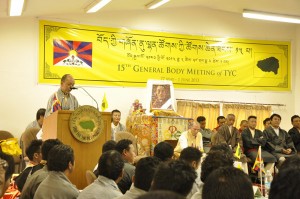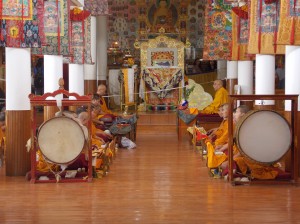
TYC President Tsewang Rigzin at the 15th Greneral Body Meeting of TYC
Photo: Phayul/Phuntsok Yangchen
The Tibetan Youth Congress (TYC) is an organisation of Tibetans united in their common struggle for the restoration of complete independence for the whole of Tibet. It is an independent organisation which has emerged as one of the largest non-government organisation of Tibetans in exile with more than 30,000 members worldwide, and commands a large following inside Tibet. TYC does not subscribe to any particular political ideology nor to any particular religion or religious sect.
They hold meetings annually and the heads of every branch, or chapter, worldwide, gather. This year their 6-day, 15th annual meeting opened on May 27 to discuss eight Agendas:
First Agenda: to discuss the previous year’s issues.
Second Agenda: to go through the annual reports and financial accounts of the TYC head quarters and every regional Chapter.
Third Agenda: to review the previous year’s decisions to see if they accomplished their set goals.
Fourth Agenda: to discuss various topics related to political issues; their stand on political ideology and organisation of political activities. Examples of their political activities are:
- How to make their activities stronger and better than before and more effective to fulfill TYC objectives.
- In what way, or how to fulfill Tibetan martyrs’ last words.
- Different kind of initiatives which can be plotted against the Chinese Government to achieve the release of all Tibetan political prisoners, including the highest Tibetan Lama, the Panchen Lama in Tibet.
- Organising activities to stop the environmental destruction in Tibet by the Chinese government, including the extraction of minerals and deforestation.
- How to make the exile Tibetan community a more advanced and better democratic system.
Fifth Agenda: to discuss the preservation of Tibetan culture and religion.
Sixth Agenda: to discuss security for His Holiness from any kind a threat from Dorje Shugden and the Chinese Government, and how TYC can provide more security.
Seventh Agenda: to review TYC rules and regulations and amend or introduce new rules or guides as required.
Eighth Agenda: the last session is for discussion about the various issues faced by different regional chapters and to collect their views and their feed-back.




 Print
Print Email
Email